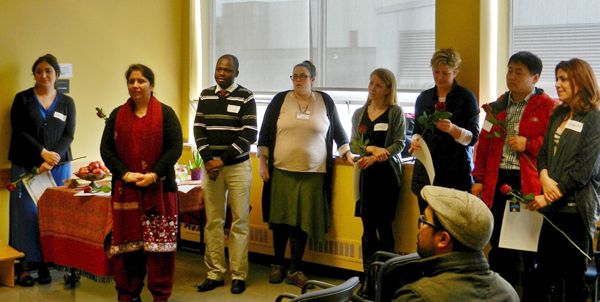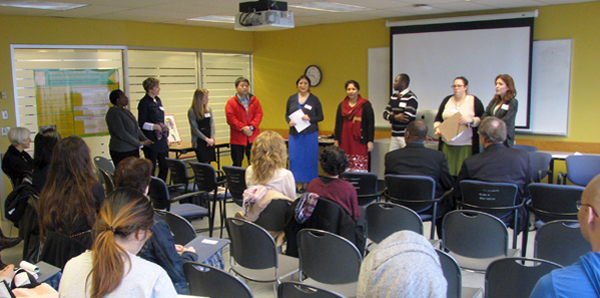The first annual EDCP Graduate Student conference became the successful student initiative in 2014 which brought together more than 60 graduate peers and student researchers from across disciplines in the domain of Education. The committee of 2014 was led by EDCP graduate student volunteers who worked hard for four months on reviewing and organizing submissions, and planning the conference event.
Conceptualizing and articulating the graduate student approach in constructing the conference infrastructure:
The annual Graduate Student Conference suggested by EDCP PhD Peer Advisor 2013-2014 Mahtab Eskandari aimed towards sustaining the students’ academic leadership in the department of Curriculum and Pedagogy. The step by step conceptualization and implementation of EGS Conference was accomplished through a six month collaboration of EDCP peers. As a result, EGS Student Conference is planned to take place once in March every year in order to provide community space for peer communication of research and scholarly work. It also provides peer review towards academic advancement for masters and PhD Students in the Department of Curriculum and Pedagogy through the following opportunities to the student community:
All submitted Students’ studies, research, authorship and/or any other form of scholarly piece should have the opportunity of being communicated with EDCP community of students, instructors and faculty. All submissions will have the opportunity of receiving peer review and feedback from within EDCP community of scholars before being presented within and beyond departmental contexts. The conference itself may act as a collective and/or particular motive for students to engage in the process of structuring scholarly pieces to be submitted. It is essential to keep the conference theme general and inclusive of as many contemporary fields and disciplines as there exist in the domain of Curriculum and Pedagogy. In the first annual EGS Conference, the cross departmental approach turned out to be a successful and educational one linking EDCP peers with LLED and CILS peers.
EDCP volunteers as Conference committee members:
The EDCP Graduate Student Conference is a student initiative and therefore is to be designed, planned and implemented by EDCP graduate students. This once per year opportunity is to be offered to everyone. The goal is to involve EDCP graduate students in the following experiences prior to and during the conference event: Design, organization and planning of the conference, peer review of submitted abstracts, categorizing submissions and identifying themes for conference sessions, event management and technical support, and session moderations.
The 2014 EGS Committee mandate was to include everyone who responds to the volunteer call. The peer advising strategy was to lead the team in a manner that each volunteer feels that she/he is a co-leader. The committee approved that there should be no centralized power or hierarchy within the team. Peer advisors and volunteers are to be at the same level of power. Tasks are assigned by volunteers themselves according to their potential and interest. All ideas and plans are to be communicated within the team and decision making is based on collective agreement. The conference team of peer advisors are responsible to inform all volunteer members of all last minute changes/plans proposed from the department.
The 2014 story of success:
As offering volunteer time and expertise in graduate organizations requires dedication, the 2014 committee recommended that volunteer’s opinion about their expected/wished mode of acknowledgement can be asked. In the first annual EGS conference committee, this question was posed by the peer advisor to all volunteer members. The members emphasized that each have stepped forward to volunteer with no prior expectations in mind, but in response to the posed question they stated that they wish to receive a letter of reference/recognition. The department prepared certificates for all committee members in response to the request. On March 28, 2014, during conference closing remarks, the certificates of acknowledgment were given to committee volunteers by Professor Peter Grimmett, EDCP Department Head, Professor Samson Nashon, EDCP Deputy Head and Graduate Advisor, Basia Zurek, EDCP Graduate Program Assistant. The committee members received appreciation roses for their unique contribution to the graduate student community.
The big event day on March 28, 2014:
The General Theme for EGS Conference 2014 was “Education and discourse: Sharing our journeys across disciplines”. The conference presentations were in the contemporary formats of paper presentations, posters, panels and symposia, art work, poetry, ritual, media, workshop and roundtable discussions. The 2014 conference presenters were:
Joanne Ursino, MA EDCP, Mu Yang, MA EDCP, Mahtab Eskandari, PhD EDCP, Jee Yeon Ryu, PhD EDCP, Latika Raisinghani, PhD EDCP, Yu Ling, PhD EDCP, Jung Jung Hoon, PhD EDCP, Joanne Price, PhD EDCP, A. Elizabeth Beattie, PhD EDCP, Natalia Blyasnikova, PhD LLED, Nicola Friedrich, PhD LLED, Julia Ostertag, PhD EDCP, Espen Stranger-Johannessen, PhD LLED, Antonia Lazarova, MA EDCP, Sumin Fang, MA LLED, Laura Teichert, PhD LLED, Sylvia Mclellan, PhD EDCP, Harini Rajagopal, PhD LLED, Wanying Wang, PhD EDCP, Katie Gemmel, MA EDCP, Anna Mendoza, MA LLED, Kwesi Yaro, MA EDCP, Elisabeth Williams, MA LLED, Nasim P.Azadi, MEd EDCP, Sandra Delgado & Michelle Gautreaux EDCP.
EDCP Graduate Student Conference 2014 Newsletter link.
Submitted by Mahtab Eskandari, PhD student, EDCP.



